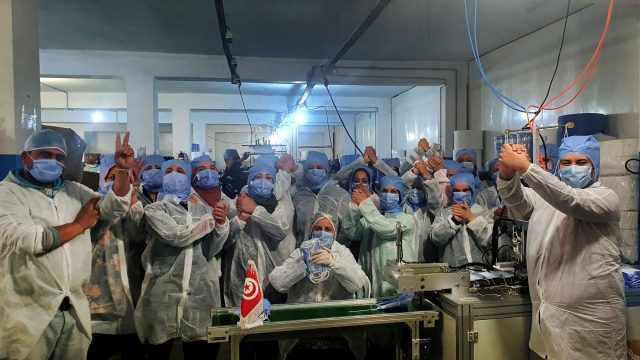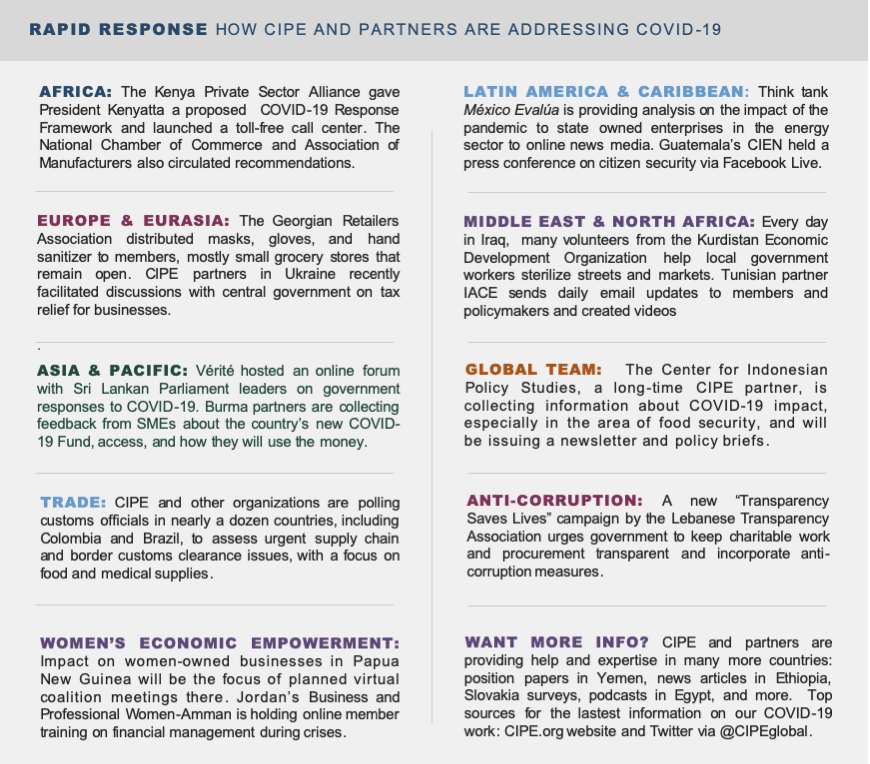How We Are Providing Immediate Assistance and Developing Long-Term Strategies to Economic Challenges
We are in a time like no other. Not only are families around the world struggling with a massive health crisis, but the COVID-19 pandemic is having a devastating impact on the global economy that is being felt in nearly every household. Small or medium businesses and their employees are among the hardest hit. Meanwhile, many governments are scrambling to respond, while also continuing basic services. The Center for International Private Enterprise, which focuses on business-led solutions and advocacy in emerging economies, is in a unique position to help with recovery efforts, both immediate and long-term.
CIPE has ground-level partners, as well as resources, in nearly a hundred countries and they are moving quickly to make things better in their communities and beyond, drawing on lessons learned from the organization’s 37-year history of re-building economies and work in post-conflict zones. CIPE regional teams are quickly developing and executing rapid response strategies in all corners of the world, including adapting dozens of current global programs and toolkits, as well as creating new ones, to overcome this challenging situation.
“We know that even a battered private sector must play a role in preserving stability in society, but it must also be a partner to its government in helping address health care and human needs.” – Andrew Wilson
“We as an organization are moving from a period of tactical adjustment in our work to a new phase of strategic thinking about the direction of our programs,” said CIPE Executive Director Andrew Wilson. “We know that even a battered private sector must play a role in preserving stability in society, but it must also be a partner to its government in helping address health care and human needs. In the short term, our work must help ensure that businesses around the globe can survive this period, and when the need for economic restoration appears, the private sector must play that most vital role of all: creating jobs and restoring prosperity.”
Initial CIPE activities have focused on helping business associations, local chambers of commerce, and think tanks respond to challenges in their communities and reduce the impact of COVID-19 to businesses and keep members informed. Partners on the ground are canvassing their peers to drill down on the top problems, then initiating activities and services to keep the business community connected and provide feedback to governments. This includes private sector recommendations on response or recovery measures and connecting governments with key players who can help.
Partners are also providing economic analyses and creating online offerings to the public, including virtual events. Meanwhile, CIPE is coordinating with other international development agencies and multinational corporations that can provide assistance. “Donors are asking us what we can do… and what they should be doing,” Managing Director of Programs Abdu Alkebsi recently told staff.
 Much of the current work falls into four categories, which are typically core functions of membership-based business organizations: policy advocacy, corporate social responsibility, information, and services to help build or maintain capacity. All of this and more is happening now:
Much of the current work falls into four categories, which are typically core functions of membership-based business organizations: policy advocacy, corporate social responsibility, information, and services to help build or maintain capacity. All of this and more is happening now:
Policy Advocacy: leadership and recommendations
- Global: Trade teams are polling customs officials in nearly a dozen countries, including Colombia and Brazil, to assess urgent supply chain and border customs clearance issues, with a focus on food and medical supplies.
- Kenya: Kenya Private Sector Alliance is proposing a COVID-19 Response Framework to President Uhuru Kenyatta and have launched a digital portal and toll-free call center for businesses and associations.
- Lebanon: A “Transparency Saves Lives” campaign by the Lebanese Transparency Association urges government to keep charitable work and procurement transparent and incorporate anti-corruption measures.
- Sri Lanka: Long-time partner Vérité is hosted an online discussion with Parliament leaders about government responses.

Corporate Social Responsibility: philanthropic functions
- Iraq: Each day volunteers from the Kurdistan Economic Development Organization help local government workers sterilize streets and markets.
- Lebanon: The Association of Lebanese Industrialists and Beirut Bar Association are providing $100,000 worth of sanitizing supplies to prisons, to help prevent an outbreak within incarcerated populations.
- Tunisia: The Union of Small and Medium Industries is helping to coordinate business and civic responses to C-19 in the coastal city of Sfax, from possible fabrication of hospital pumps to educational radio segments. One member donated personnel and supplies to connect a hospital to the local power grid.
Information: curating important updates
- Egypt & Ethiopia: CIPE staff and partners are releasing economic analyses in news articles and podcasts.
- Mexico: Online news media outlets are utilizing think tank México Evalúa for analysis on the impact of pandemic to state owned enterprises in the oil and energy sector.
- Turkey: OnWatch uses online and social media platforms to issue current and accurate information about COVID-19 matters
- Tunisia: IACE (Institut Arabe des Chefs d’Entreprises) sends daily email updates to members and policymakers, created informational videos, and provides analyses on economic impact and potential solutions with media.
- Burma: Local partners are collecting feedback from small and medium businesses about country’s new COVID-19 Fund, including accessibility and how they need to use the money.
Services: helping businesses build capacity
- Jordan: Business and Professional Women-Amman is holding online member training on financial management during crises, including personal finances.
- Georgia: The European Business Association and the HR Professionals Association offers joint webinars and consulting to companies shifting to telework. The Georgian Retailers Association distributed masks, gloves, and hand sanitizer to members, which are mostly small grocery stores that remain open.
- Guatemala: CIEN (Centro de Investigaciones Economicas Nacionales) has increased its online presence to monitor government response to the pandemic and held a press conference on citizen security via Facebook Live.

The activities are strengthening public-private partnerships and helping businesses build resilience and modernize. “This is a critical time for chambers and associations to be engaged in constructing solutions,” said CIPE Middle East and North Africa Senior Program Officer Stephen Rosenlund, “There are remarkable examples around the world of ways organizations are getting involved in designing policy solutions in the crisis.”
At the same time, many experts caution that autocrats and other forces will seek to exploit the COVID-19 crisis to gain power or influence through “pandemic propaganda” and restrictions under the guise of safety. “In other free countries around the world, governments are struggling to deliver services, but to date, we have seen citizens remain responsible in the face of fear and uncertainty. In less-free places, authoritarians are attempting to grab more power under the rubric of public health needs and there is great fear this trend will intensify,” said Wilson. CIPE Europe and Eurasia Senior Program Officer Eric Hontz elaborated: “This is an opportune time to make mischief… When the world is desperate for capital, compromises might be made. How do we keep standards high and capital flowing?”
There are also worries about how the pandemic will impact competition for global leadership over time. However, history tells us that countries that build and maintain democratic governance are better able to weather crises of this magnitude, thus plans based on free market principles will be key to adopting healthy forms of assistance and recovery that benefit all citizens.
“Our partners around the world will be at the center of this struggle and they are counting on us to support them… This is what we do,” said Wilson. CIPE Senior Consultant and Trainer Camelia Bulat, who is based in Romania, offered additional insight about the strength and positivity she witnesses among partners: “These days there is a solidarity and connection between people that you don’t see in regular conditions. And I think this is something we can help with.”
In the coming weeks and months, CIPE will introduce readers to more colleagues on the ground who are making a difference and the people they are helping, as well as highlight both the innovative and the unconventional work being carried out.
Published Date: April 10, 2020
